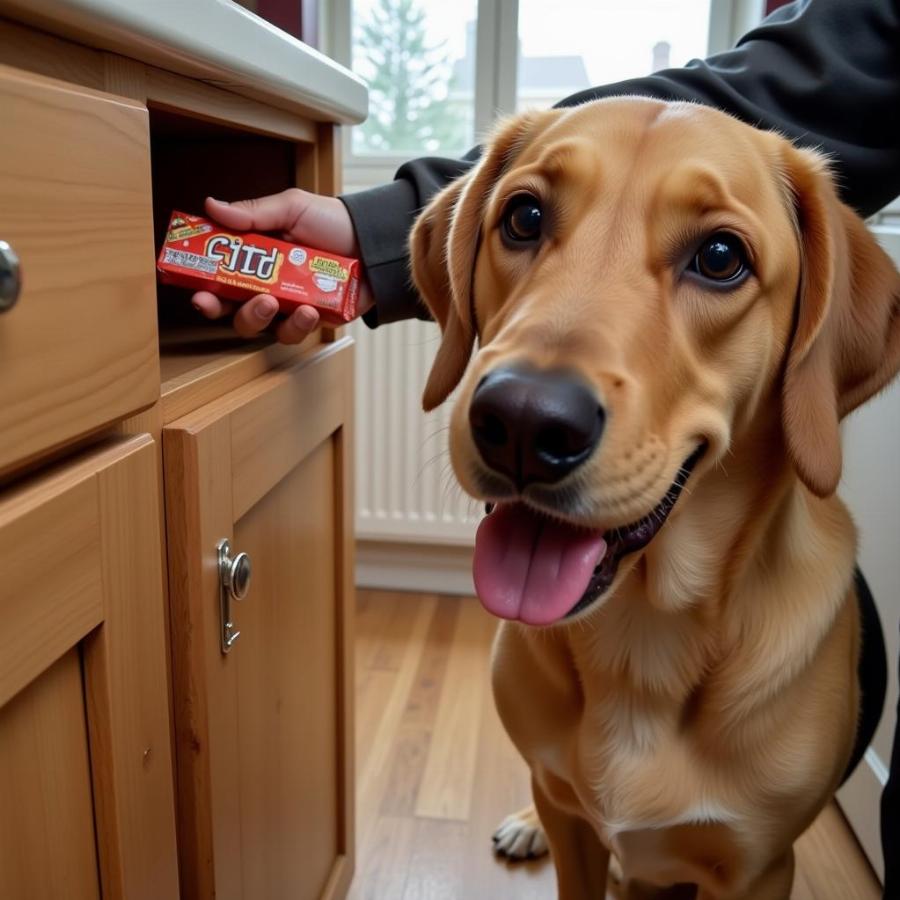If your dog ate gum, you’re probably worried. Discovering your furry friend has gobbled down a wad of chewing gum can be a frightening experience. This seemingly harmless treat for humans can pose a potential hazard to our canine companions. This article will cover everything you need to know about what happens when a dog eats gum, the potential dangers, what to do if your dog ingests gum, and how to prevent this from happening again.
Understanding the Risks of Gum for Dogs
Why is gum bad for dogs? While the occasional small piece of gum might not cause serious harm, especially sugar-free varieties, the real danger lies in the ingredients. Many gums contain xylitol, an artificial sweetener that is toxic to dogs. Even small amounts of xylitol can cause a rapid drop in blood sugar (hypoglycemia), leading to weakness, lethargy, seizures, liver failure, and even death. Even if the gum doesn’t contain xylitol, the gum base itself is indigestible.
What to Do If Your Dog Eats Gum
If you know your dog ate gum, especially if it contains xylitol, act quickly. Immediately contact your veterinarian or an emergency animal hospital. Time is of the essence in xylitol poisoning cases. The sooner treatment is started, the better the prognosis. Be prepared to provide information about the type of gum, the amount ingested, and your dog’s size and weight. If you’re unsure whether the gum contained xylitol, err on the side of caution and seek veterinary advice.
Signs of Xylitol Poisoning in Dogs
Knowing the signs of xylitol poisoning can be life-saving. Symptoms can appear within 15-30 minutes of ingestion and include:
- Vomiting
- Weakness
- Lethargy
- Lack of coordination
- Seizures
- Collapse
Preventing Gum Ingestion in Dogs
The best way to deal with gum ingestion is to prevent it altogether. Keep gum, especially sugar-free varieties, out of reach of your dog. Store it in high cabinets, drawers, or purses. Educate family members, especially children, about the dangers of gum for dogs. Dispose of used gum responsibly in closed containers. Train your dog a strong “leave it” command. This can be invaluable in preventing them from picking up dropped gum or other potentially harmful items.
What about other candies? Can dogs eat gummy bears?
While we’re on the topic of sweets, it’s important to remember that many other candies are also dangerous for dogs. can a dog eat a gummy bear explains the potential dangers of gummy bears and other gummy candies for dogs.
Long-Term Effects of Gum Ingestion
Even if your dog doesn’t experience immediate symptoms after eating gum without xylitol, larger pieces or frequent ingestion can lead to gastrointestinal issues like blockage or constipation. can dogs eat gummy worms discusses similar concerns with gummy worms and other types of candy.
 Ngăn ngừa chó ăn kẹo cao su
Ngăn ngừa chó ăn kẹo cao su
Conclusion
“My dog ate gum” is a search query filled with worry and concern. While the outcome depends on the type and amount of gum ingested, prompt action and veterinary care are crucial, especially if xylitol is involved. Prevention is always the best approach. Keep gum out of your dog’s reach and be mindful of other potential hazards in your home. can dogs eat gummy bears offers further insight into the dangers of sweets for dogs.
FAQ
- What is the most dangerous ingredient in gum for dogs? Xylitol, an artificial sweetener.
- How much xylitol is toxic to dogs? Even small amounts can be dangerous.
- What are the signs of xylitol poisoning? Vomiting, weakness, lethargy, seizures.
- What should I do if my dog ate gum with xylitol? Contact your veterinarian immediately.
- How can I prevent my dog from eating gum? Keep gum out of reach and train a strong “leave it” command.
- Can dogs eat any type of gum? No, all types of gum pose potential risks.
- Is it safe to give my dog sugar-free candy? No, many sugar-free candies contain xylitol.
Beaut Dogs is your trusted source for all things dog-related. We provide comprehensive information on dog breeds, care, and health to help you be the best pet parent possible. For any questions or concerns, contact us at Email: [email protected]. Beaut Dogs is committed to providing accurate and helpful information to dog owners everywhere.